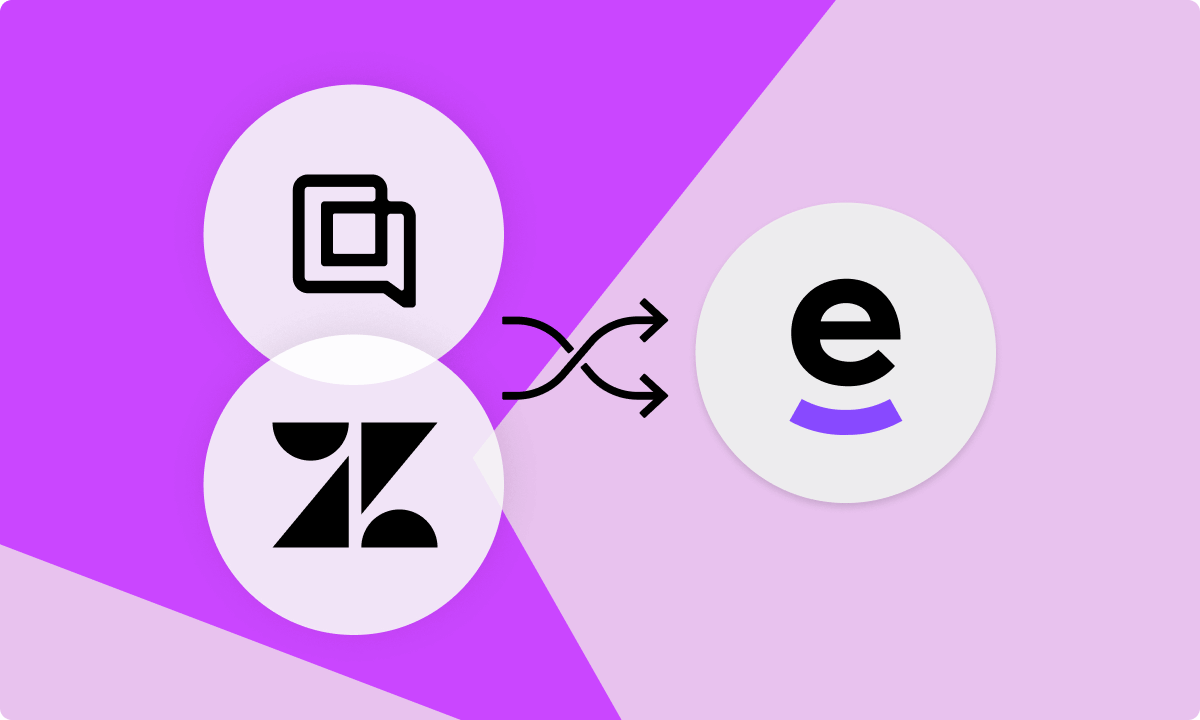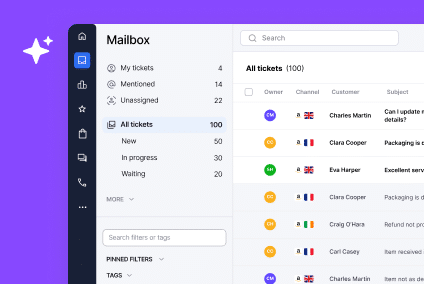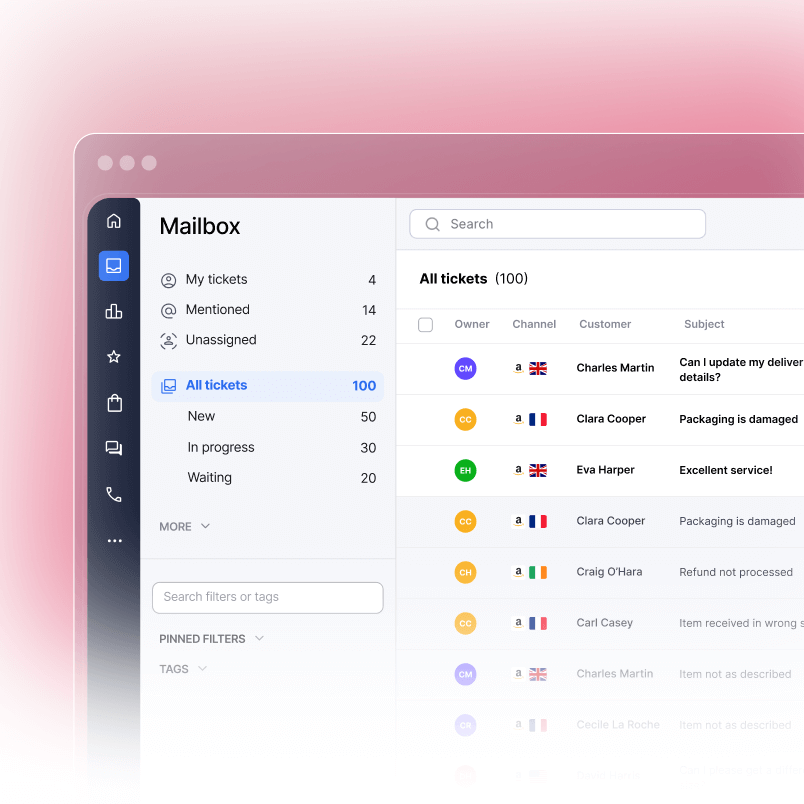In the world of customer support, a team’s help desk is the central hub for all external communication. Along with being the way customers contact you and agents respond, it’s also generally how teams get additional insights like what issues cause the most tickets to come through and when volumes are highest.
Since it plays such a pivotal role, it’s important teams find a tool that’s the right fit for their needs. One that amplifies a team’s strengths and helps them overcome their challenges. And over the last handful of years there have been quite a few new entrants into the help desk space. So, making the right choice is more complicated than ever.
When the options seem endless, just getting started with the selection process can quickly seem overwhelming. With that in mind, we decided to take a look at two options on the market today: Zendesk and Gorgias.
In this article, we look at each tool individually, explore what they have in common, and what their core differentiators are.
Zendesk overview
Zendesk is one of the more recognizable names in the help desk world. They’ve made solutions for customer service professionals since 2007. They started with a shared inbox tool and over the years the product developed into a whole suite of products like a knowledge base builder, live chat tool, and more.
Zendesk is generally marketed as a solution for all different types of customer services teams. However, most consider it mostly a tool for larger, enterprise-sized, teams.
Look for other Zendesk alternatives? → Best Zendesk Alternatives
Gorgias overview
Gorgias is a relative newcomer in the help desk world. They started in 2015 as a Chrome extension and developed into a full-blown software product shortly thereafter. Similar to Zendesk, over the years they’ve added to their product and now offer a suite of tools to help customer service teams handle incoming requests.
Unlike Zendesk, Gorgias doesn’t market itself as a solution for all customer support teams, instead they focus primarily on small ecommerce sellers.
Look for other Gorgias alternatives? → Best Gorgias Alternatives
Similarities between Gorgias and Zendesk
Even though Zendesk and Gorgias are realistically built for different types of teams, there are a few features they have in common. Below we explore a few similarities between the two tools.
Integrations
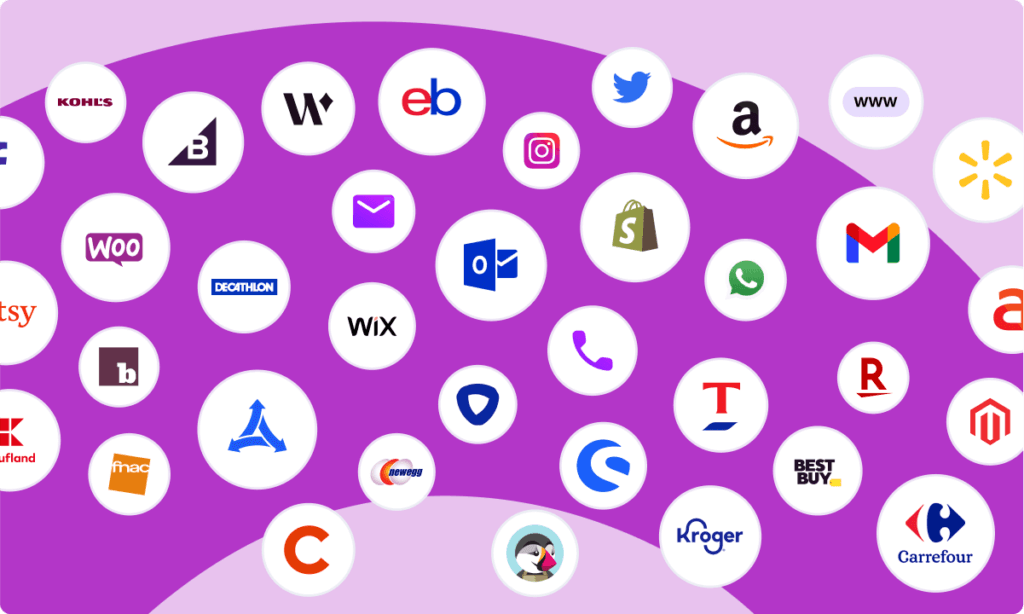
Chances are your help desk isn’t the only tool in your customer support stack. Connecting all the different tools your team uses daily is a great way to save time for both customers and agents alike. And if you work in the world of eCommerce being able to connect to online stores can save even more time for agents and customers.
Both Gorgias and Zendesk integrate with a number of online shops like Shopify and BigCommerce. With those integrations, you’re able to see order details and process refunds directly in your help desk tool without navigating away.
Though they include some online store integrations neither has native integrations with major online marketplaces like Amazon or eBay. For that functionality, you’d need to turn to an option like eDesk.
Efficiency tools
Though there is a lot of customer service work that’s far from routine, there is a decent amount of repetitive tasks, too. That’s especially true for eCommerce support teams. With both tools, you’re able to do things like automatically route tickets, add tags, and update ticket status using different automations.
Depending on the Zendesk plan you’re on, there are some more advanced routing options like the ability to route based on agent skills. However, in both cases the set-up of those workflows and automations are a manual process, but there are others that don’t require that upfront time cost.
For example, eDesk’s Smart Inbox uses AI to automatically sort and assign tickets to the right folks right away. It saves teams a ton of setup time and also is continually getting smarter the more it learns. It’s a gift that keeps giving your team and customers valuable time back.
Autoresponder
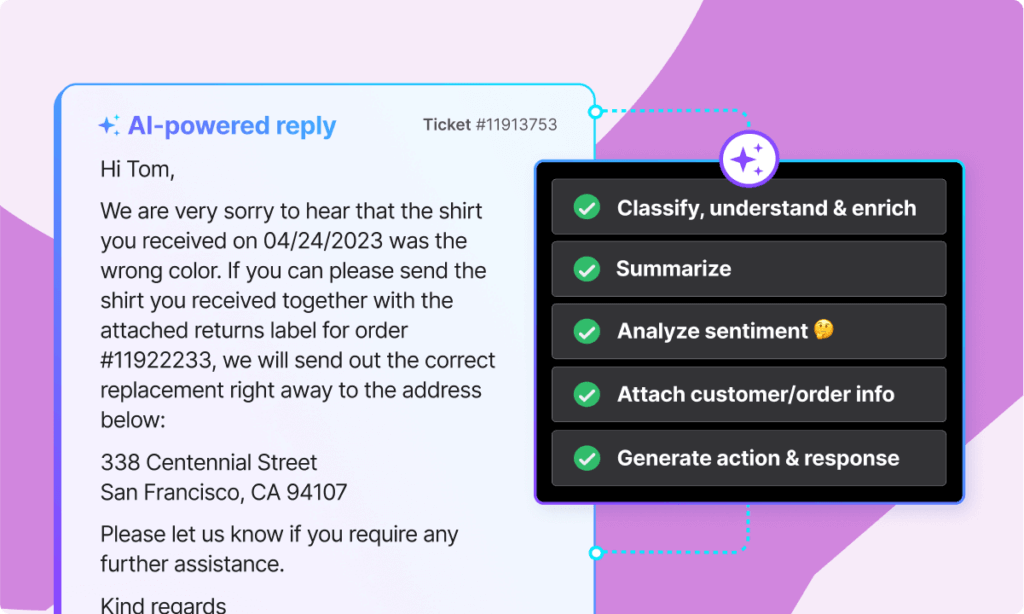
How quickly you respond to a customer matters. In fact, one study found customers said the most important factor in determining if a support interaction was good is how fast someone responded. Autoresponders are great tools to help customers get responses quickly and is something both Gorgias and Zendesk offer.
However, if you’re just responding quickly but not with relevant information, you’re basically back to square one. With Gorgias, you can create personalized autoresponder messages, but it’s only offered as a paid add on. Zendesk does offer customized auto responders on certain plans. It’s also a feature included on some other tools like eDesk, where it’s included on most plans without any additional charges.
Analytics tracking
There’s a saying that goes something like “if you can’t measure it, you can’t improve it.” With Gorgias and Zendesk, both you’re able to see team level metrics, individual performance metrics, and trend data like what times of day and days of the week are busiest.
Both also include prebuilt reporting dashboards, so there’s no initial set up to track basic metrics. That said, of the two, Zendesk certainly has more robust analytics reporting. However, advanced analytics are only included on Zendesk’s higher-cost plans and do require a decent amount of setup.
Gorgias also offers what they call revenue statistics. It is essentially a way to track what support conversations turn into sales. It’s an interesting feature that can provide some good insights, but occasionally the evidence for what leads to a sale from a support conversation can be a bit more anecdotal and less scientific.
Differences between Gorgias and Zendesk
Even though there’s a decent bit that’s similar between these two tools, there’s also a lot that’s different. Below we cover some key differences for each.
Pricing
One of the most significant differences between Gorgias and Zendesk is pricing. Zendesk has a pretty standard pricing model. They have a few different plan levels and then charge per seat based on what plan you’re on (for example, if you were on the Suite Growth plan you’d pay $89/month per agent).
Gorgias also offers a few different plan levels, however instead of going by seat they go by ticket volume. So, the more tickets you get the more expensive it is. Each plan includes a ticket allotment for the month. If you exceed that allotment , you pay for additional blocks of tickets. There are also agent limits on all their plans, which is another thing to think about.
An option like eDesk offers a volume-based plan, but we don’t limit the number of seats on the plan. Our volume-based plan also includes all available features without the need for any additional add-ons. Whereas with Gorgias there are several features that can only be done as add-ons.
With Zendesk access to features is solely dictated by the base plan you choose. You can technically add as many agents as you’d like but as mentioned above, you pay for each new seat. So, for larger teams, the cost adds up rapidly.
Management tools
Both Zendesk and Gorgias let you do things like create team specific queues and automatically route tickets using custom workflows you can build, but the level of potential customization you get with Zendesk is unmatched by Gorgias.
For example, with Zendesk you can create contextual workspaces for different sets of agents, essentially allowing you to have multiple instances of Zendesk. Meaning an agent in one workspace would see entirely different queues and have access to different macros.
Zendesk also offers the ability to do skills-based ticket routing, so conversations are automatically sent to the right people right away. Further, they also offer the ability to create custom analytics dashboards.
Last, Zendesk has multilingual support capabilities. In practice, what it means is that you could create self-serve content and support forms in multiple languages and depending on where someone is based, they’ll see those items in their local language.
Who is Zendesk right for?
If you’re a large team that needs specific workspaces, advanced analytics, and things like a customer portal, then Zendesk is probably the right tool for you. Also, if you need to do multilingual support, it’s a great option. It has all of those features and more.
However, it is good to keep in mind that if you’re using those more advanced features, there will be a long set-up time. It could take as much as 4–6 months to get everything in place and then even more time to get your team onboarded. If you have a big budget, then that’s probably a non-issue. But, if you are an online seller, then it’s worth keeping in mind that you will need other paid 3rd party integrations to connect to marketplaces & online stores.
Who is Gorgias right for?
Gorgias is likely best for smaller ecommerce stores that have relatively stable ticket volumes and don’t sell on marketplaces. Their revenue statistics feature is also fascinating, though it can be a little tricky to set up.
However, if your ticket volumes vary, and you have a more strict budget, Gorgias might not be right for you. Having only a volume-based pricing model can make forecasting costs difficult and for leaner teams that could present a big issue.
3 Gorgias and Zendesk alternatives
There’s no doubt that Zendesk and Gorgias are great tools in certain scenarios, but they’re far from the only options on the market. Below are three alternatives to consider in your search.
eDesk
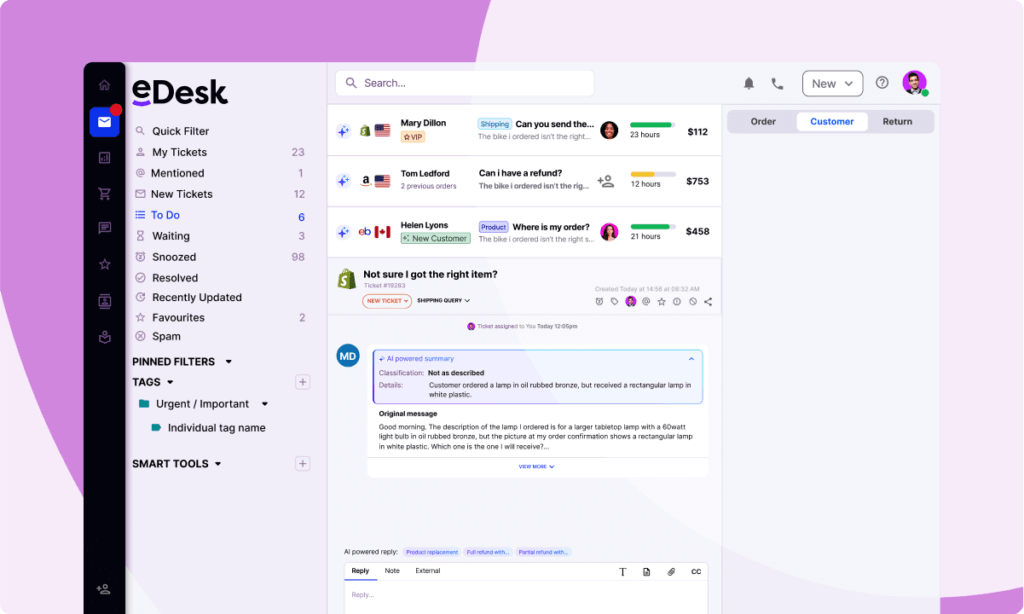
Best for serious eCommerce sellers
eDesk is an eCommerce help desk that gives teams the tools they need to create outstanding customer experiences. Their smart inbox automatically organizes requests, saving teams tons of time and effort and ensuring customers get the quickest response possible.
eDesk also has native integrations with hundreds of online marketplaces and web stores like Amazon and Shopify, helping give your team additional information like order details without having to switch tools. You also get access to a knowledge base builder, live chat capabilities, and an AI-powered automations like autoresponder, summaries and much more to help reduce ticket volumes for your team.
Learn more about eDesk:
Gmelius
Best alternative for teams using Gmail
The best way to think of Gmelius is as a Gmail overlay. It gives teams shared inbox capabilities in Gmail. Meaning you can assign conversations to specific agents, leave notes on conversations, and create individual and team queues to improve organization and stop things from falling through the cracks.
However, it does lack additional support channels like a knowledge base builder and chat capabilities. Further, there aren’t as many integrations and their analytics only cover a 6-month period at most, which could be problematic for certain teams.
Price: Starts at $15 per month.
Freshdesk
Best alternative for larger teams
Freshdesk is a very similar tool to Zendesk. They offer omnichannel tools to support customers across a variety of channels like email, social sites, live chat, and phone. One standout feature is that they have included minutes on all their plans, so if you do a good amount of phone support it could be one to look into.
However, similar to Zendesk, setting up Freshdesk can take a good bit of time and can be fairly resource intensive. So, if you’re looking to get started quickly, it might not be the right option for you.
Price: Free plan available. Paid plans starting at $15/agent per month.
Final thoughts
Picking a help desk isn’t always the easiest task. It’s a big choice with significant implications, so getting it right is of the utmost importance. Knowing your options is a good place to start and Gorgias and Zendesk are both good ones to consider. However, what matters most is knowing what’s most important to your team and its needs.
Get feedback from multiple stakeholders, decide what is non-negotiable, and test out some options. As long as you’re thoughtful and thorough in your search, you’ll be well on your way to finding the perfect fit.
